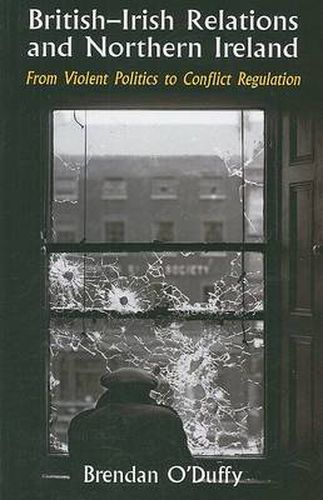Readings Newsletter
Become a Readings Member to make your shopping experience even easier.
Sign in or sign up for free!
You’re not far away from qualifying for FREE standard shipping within Australia
You’ve qualified for FREE standard shipping within Australia
The cart is loading…






This book examines the evolution of British Irish relations since 1921 and applies theories from political and social sciences, including international relations to the Irish/Northern Irish case. The book includes the generation and analysis of primary data on violence and constitutional debate; the analysis of primary sources such as state papers and elite interviews with British and Irish officials, representatives of constitutional political parties in Northern Ireland and leaders and activists of republican and loyalist parties/organisations. Part 1 looks at how the attempt to regulate the Irish nationalist challenge to the British state (through dominion status for the Irish Free State and partition) impacted on governance in both jurisdictions. The re-opening of the (Northern) Irish Question in the late 1960s is then analysed to demonstrate the continued primacy of opposing claims to national self-determination and their impact on subsidiary levels of conflict.The final part, covering the year 1985 to the present, then demonstrates how the relative equalization of national status, reflected in the bi-national, inter-governmental relationship, has been successful in regulating conflict by integrating, vertically, the bi-nationality at state, governmental and societal levels. Finally, implications of the British-Irish approach are developed as contributions to the comparative theory and practice of ethno-national conflict regulation.
$9.00 standard shipping within Australia
FREE standard shipping within Australia for orders over $100.00
Express & International shipping calculated at checkout
This book examines the evolution of British Irish relations since 1921 and applies theories from political and social sciences, including international relations to the Irish/Northern Irish case. The book includes the generation and analysis of primary data on violence and constitutional debate; the analysis of primary sources such as state papers and elite interviews with British and Irish officials, representatives of constitutional political parties in Northern Ireland and leaders and activists of republican and loyalist parties/organisations. Part 1 looks at how the attempt to regulate the Irish nationalist challenge to the British state (through dominion status for the Irish Free State and partition) impacted on governance in both jurisdictions. The re-opening of the (Northern) Irish Question in the late 1960s is then analysed to demonstrate the continued primacy of opposing claims to national self-determination and their impact on subsidiary levels of conflict.The final part, covering the year 1985 to the present, then demonstrates how the relative equalization of national status, reflected in the bi-national, inter-governmental relationship, has been successful in regulating conflict by integrating, vertically, the bi-nationality at state, governmental and societal levels. Finally, implications of the British-Irish approach are developed as contributions to the comparative theory and practice of ethno-national conflict regulation.